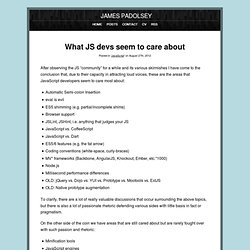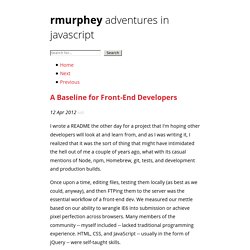

Presentation tool based on the power of CSS3 transforms and transitions in modern browsers. Breaking Bad - CodeCast. What JS devs seem to care about. After observing the JS “community” for a while and its various skirmishes I have come to the conclusion that, due to their capacity in attracting loud voices, these are the areas that JavaScript developers seem to care most about: Automatic Semi-colon Insertion eval is evil ES5 shimming (e.g. partial/incomplete shims) Browser support JSLint, JSHint, i.e. anything that judges your JS JavaScript vs.

CoffeeScript JavaScript vs. Dart ES5/6 features (e.g. the fat arrow) Coding conventions (white-space, curly-braces) MV* frameworks (Backbone, AngularJS, Knockout, Ember, etc.*1000) Node.js Millisecond performance differences OLD: jQuery vs. Dojo vs. YUI vs. To clarify, there are a lot of really valuable discussions that occur surrounding the above topics, but there is also a lot of passionate rhetoric defending various sides with little basis in fact or pragmatism. On the other side of the coin we have areas that are still cared about but are rarely fought over with such passion and rhetoric:
JSLint,The JavaScript Code Quality Tool. Socket.IO: the cross-browser WebSocket for realtime apps. A Baseline for Front-End Developers. 12 Apr 2012 edit I wrote a README the other day for a project that I'm hoping other developers will look at and learn from, and as I was writing it, I realized that it was the sort of thing that might have intimidated the hell out of me a couple of years ago, what with its casual mentions of Node, npm, Homebrew, git, tests, and development and production builds.

Once upon a time, editing files, testing them locally (as best as we could, anyway), and then FTPing them to the server was the essential workflow of a front-end dev. We measured our mettle based on our ability to wrangle IE6 into submission or achieve pixel perfection across browsers. Many members of the community -- myself included -- lacked traditional programming experience. HTML, CSS, and JavaScript -- usually in the form of jQuery -- were self-taught skills. Something has changed in the last couple of years. Whatever it is, I think we're seeing the emphasis shift from valuing trivia to valuing tools. JavaScript Testing The End. Rmurphey/js-assessment. Superheroic JavaScript MVW Framework. Google I/O 2012 - Better Web App Development Through Tooling.
Dragonfly - Bug control, accelerated. Happy first birthday to Blink By Bruce Lawson · Thursday, April 3, 2014 0 Twelve months ago today, I stayed up past my bedtime to blog about the new rendering engine, Blink, being forked from WebKit.

As it's Blink's first birthday, let's take a brief look at where we've got to. Read more… Introducing the world’s most useless extension By Andreas Bovens · Tuesday, April 1, 2014 0 We're proud to introduce the world’s most useless extension for your daily use and enjoyment. Read more… Removing showModalDialog() from the Web platform By Mathias Bynens · Thursday, March 27, 2014 0 The showModalDialog() API is being removed from the Web platform. This post explains why, and what the consequences are for web developers. Read more… Practical application and usage of the W3C Device Orientation API By Rich Tibbett · Wednesday, March 26, 2014 0 The W3C's device orientation API allows us to determine the orientation of a device in physical space.